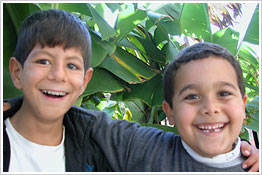A Fathers' Day Story about Two Sons
The story of the Prodigal Son sheds light on fatherhood as much as on the role of two very different children. It relates to all of us, parents and children, because God is our ultimate Parent.
By Caryl W. Krueger
Categories: Fatherhood, Fatherhood/Motherhood, Jesus (Parables) Of course you know the story of the Prodigal Son - in fact, you might agree that it could be called the Prodigal Sons, since each lad had something to learn. It's equally interesting to study this parable in terms of the father's role.
 At this season of honoring Fathers and Grandfathers, it is wise for a parent to talk about ultimate Fatherhood/Parenthood. Many families are without a father, or the father is away, or he fails to give input. This is all the more reason why we need to see that children can not be deprived of the best of fatherhood qualities under any circumstances because we all have the best parent: God. At this season of honoring Fathers and Grandfathers, it is wise for a parent to talk about ultimate Fatherhood/Parenthood. Many families are without a father, or the father is away, or he fails to give input. This is all the more reason why we need to see that children can not be deprived of the best of fatherhood qualities under any circumstances because we all have the best parent: God.
You might want to review this parable found in Luke 15: 11-32. The first part of the parable makes it apparent that the father does not discourage the younger son from his own adventure away from home - he lets him learn, and then, when the boy "comes to his senses," he welcomes him home with a grand celebration.
In illustrating God as the father, Jesus shows a parental love that is forgiving. However, the older son sinks into jealousy and pettiness. Again, the father reaches out to this son, assuring him that "all that I have is thine." In other words, look up from your woes, son, and see that you've always had everything you needed…and always will. And there the story ends and it is left to us to figure what happens to him.
Ask your youngsters what they think would be a proper response. Was the older son correct in his insistence that as the good, responsible one, he has been cheated out of a party? Is he right in feeling less loved? In parenting, we often see that the needy child gets more time and attention and encouragement, as in homework and sports. Is that fair? Just what does "fair" mean?
But, did the older son have to eat farm rubbish? Did he sleep in the cold outdoors? Did he wear rags? Rather, didn't he feel confidence and comfort in his abilities to manage things on his own?
In the book "The Preaching Life by Barbara Brown Taylor, it says, speaking of the father, and of God as Father: "He does not love either of his sons according to what they deserve. He just loves them, more because of what he is than because of what they are." God loves because that is truly what He is. So are not both sons the beloved children of God?
We are all prodigals at one time or another. Sometimes we too run away from things. Sometimes we must admit our mistakes. Like the younger son, we must "come to our self." And what is the result? A Father who is always ready and waiting to welcome us home. Be sure to take note that the father goes to the son - a good parenting parallel for our reaching out to the wayward one. This action proves that the son's riotous ways are not recognized as part of him! Plus, the father is not interested in the details, he is ready for the reunion with his "lost" son. No recriminations, just joy. Can we do that under similar circumstances?
Continue your discussion. What can we conclude about the older son who is so bitter? Perhaps he too has a lesson to learn. Whether we are the younger or older son, can we admit a mistake, correct it, and move on without pointing fingers?
Since the story of the older son is not resolved in the Bible, it is up to you and your family to give it an ending. I sincerely hope that you don't choose to let this son just go away angry. He, too, can "come to himself" in time to rejoice in the celebration of life that the heavenly Father has prepared for us all. |